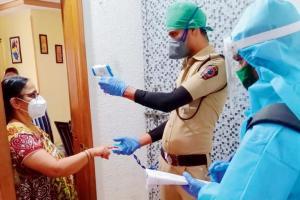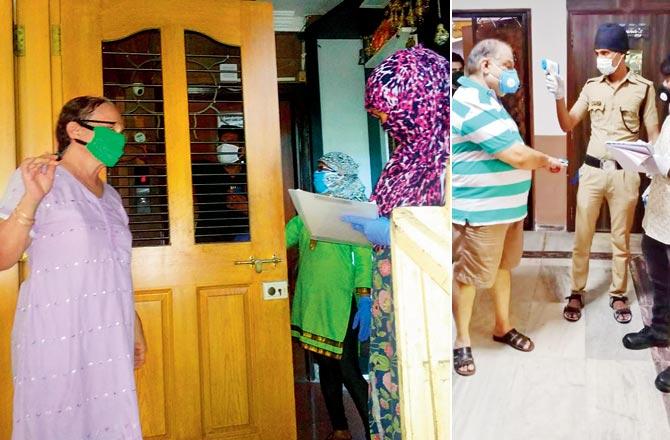Number is almost a fourth of total cases in the critical ward, highlighting the importance of co-operating with officials

A team conducts door-to-door check-ups at an Amboli high-rise on Tuesday
Door-to-door screening conducted by BMC officials and health workers appears to be helping the civic body in early detection of COVID-19 patients in K West ward (Andheri West and Oshiwara), which currently has the fourth highest number of cases in the city. Since March, the process has helped teams identify 1,258 patients, which is a quarter of the ward's total tally of 5,324 cases.
ADVERTISEMENT
According to official data obtained from the ward, a total of 2,37,933 people across 61,531 households have been screened using the door-to-door method since March. Out of these, a total of 1,604 people were made to undergo COVID-19 tests. Of them, 1,258 tested positive for the viral infection.
Early detection
According to the ward officials, though the process was time-consuming, it helped them greatly in early detection of cases in slum areas during April and May, the time around when the slum areas were reporting a much higher number of cases compared to high-rises. But as the trend has reversed over the past one month, the teams are aggressively conducting door-to-door screening in sealed residential buildings.

The civic body has started conducting door-to-door screening in high-rises in areas like Amboli and Aaramnagar
Speaking to mid-day, assistant municipal commissioner of K West ward, Vishwas Mote, said, "Door-to-door screening helps in detecting cases early, which gives us a head start in trying to contain the spread of the virus. During April and May, we were fighting the virus mainly in slum areas because that's where the outbreak was much more severe. We conducted door-to-door screening in these areas keeping in mind the strategy of early detection. This resulted in a drastic decrease in the number of positive cases in slums. The curve has almost been flattened in these areas."
Changing trends
Mote further said that high-rises in the ward were currently reporting a much higher number of positive cases than slums. On July 20, a total of 46 positive cases were reported in the ward, out of which only five were from slum areas. "This was not the case earlier, when at least 70 per cent of the total cases in the ward were from slum areas. Since we were successful in detecting cases early through the door-to-door screening method in slums, we have implemented the same for buildings as well. However, it might take some more time in this case, but we will definitely succeed."
When contacted, Dr Gulnar Khan, health officer at the ward, said that people were hesitant initially when the screening teams approached them.
"We try to convince them about the importance of early detection, after which they cooperate. In addition to screening the buildings, our agenda is to also provide counseling and convince the secretary and chairman about the importance of conducting thermal screening, oximeter check-ups and oxygen cyclones at the society in case of an emergency."
Mote further said, "It is important for people to cooperate with the BMC and health officials because door-to-door screening helps us avoid further strain (in the detection process). Our appeal is that people should follow self-discipline. The elderly and children need to strictly stay at home."
2,37,933
No. of people screened in K West ward through the door-to-door method
1,604
No. of people who underwent COVID-19 tests based on the screening
Catch up on all the latest Mumbai news, crime news, current affairs, and a complete guide from food to things to do and events across Mumbai. Also download the new mid-day Android and iOS apps to get latest updates.
Mid-Day is now on Telegram. Click here to join our channel (@middayinfomedialtd) and stay updated with the latest news
 Subscribe today by clicking the link and stay updated with the latest news!" Click here!
Subscribe today by clicking the link and stay updated with the latest news!" Click here!






